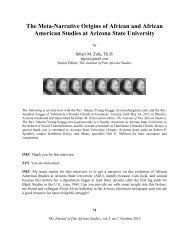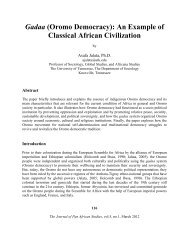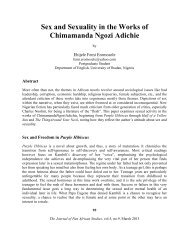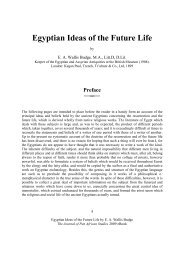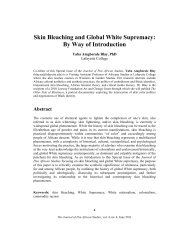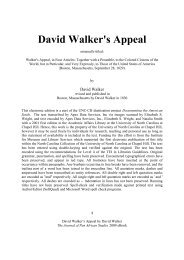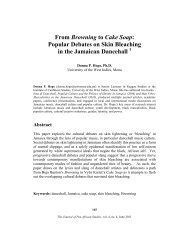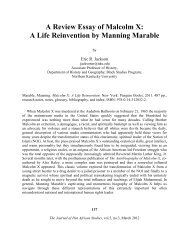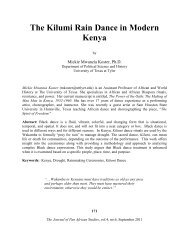On Pursuit of the Purpose of Life - Journal of Pan African Studies
On Pursuit of the Purpose of Life - Journal of Pan African Studies
On Pursuit of the Purpose of Life - Journal of Pan African Studies
You also want an ePaper? Increase the reach of your titles
YUMPU automatically turns print PDFs into web optimized ePapers that Google loves.
<strong>On</strong> <strong>Pursuit</strong> <strong>of</strong> <strong>the</strong> <strong>Purpose</strong> <strong>of</strong> <strong>Life</strong>:<br />
The Shona Metaphysical Perspective<br />
by<br />
Munyaradzi Mawere<br />
munhamanuel@yahoo.com.br<br />
Universidade Pedagogica, Faculty <strong>of</strong> Social Sciences,<br />
Department <strong>of</strong> Humanities, Xai-xai, Mozambique<br />
Munyaradzi Mawere is a philosopher at Universidade Pedagogica, and teaches Social and<br />
Political Ethics and Introduction to Philosophy, and previously taught at <strong>the</strong> University <strong>of</strong><br />
Zimbabwe.<br />
Abstract<br />
This paper concerns <strong>the</strong> question <strong>of</strong> <strong>the</strong> purpose <strong>of</strong> human life heret<strong>of</strong>ore referred to as life, as it<br />
is traditionally viewed by <strong>the</strong> Shona people <strong>of</strong> Mozambique and Zimbabwe. To most ‘ordinary<br />
people’, <strong>the</strong> question has no immediate answer. To o<strong>the</strong>rs, <strong>the</strong>re are cu de sacs- dead ends in <strong>the</strong><br />
debate on purpose <strong>of</strong> life. To partisans <strong>of</strong> ei<strong>the</strong>r position, <strong>the</strong> question is unworthy discussing.<br />
The question however has invited and incited serious debates among metaphysicians and<br />
philosophers <strong>of</strong> religion. It continues to provoke debate because <strong>of</strong> its continued relevance not<br />
only in <strong>the</strong> Shona culture but to o<strong>the</strong>rs in Africa and <strong>the</strong> world-over. There is need <strong>the</strong>refore for<br />
comprehensive research on purpose <strong>of</strong> life especially from an <strong>African</strong> perspective where research<br />
on <strong>the</strong> issue is sketchy. This concept paper <strong>the</strong>refore examines how we can seek to understand<br />
<strong>the</strong> purpose <strong>of</strong> human life on earth. Logic and Shona metaphysics are used to demonstrate that<br />
life on earth exists for a purpose. The paper goes fur<strong>the</strong>r to establish ‘love’ as <strong>the</strong> purpose <strong>of</strong> life<br />
that <strong>the</strong> Shona people <strong>of</strong> Mozambique and Zimbabwe acknowledge and foster in <strong>the</strong>ir respective<br />
societies. In <strong>the</strong> light <strong>of</strong> this, <strong>the</strong> paper contends that <strong>the</strong> purpose <strong>of</strong> life acknowledged by <strong>the</strong><br />
Shona can also apply and cut across o<strong>the</strong>r cultures in <strong>the</strong> region and <strong>the</strong> world over.<br />
Key words: <strong>Pursuit</strong>, <strong>Purpose</strong> <strong>of</strong> life, <strong>African</strong> philosophy, Shona people, metaphysical<br />
perspective<br />
269<br />
The <strong>Journal</strong> <strong>of</strong> <strong>Pan</strong> <strong>African</strong> <strong>Studies</strong>, vol.3, no.6, March 2010
Introduction<br />
The question whe<strong>the</strong>r life on earth has a purpose or not has always been central in <strong>the</strong> history <strong>of</strong><br />
humanity since time immemorial. It has been considered by Albert Camus (1981) to be one <strong>of</strong><br />
<strong>the</strong> most pr<strong>of</strong>ound and critical <strong>of</strong> all metaphysical questions. For Camus and rightly so, “whe<strong>the</strong>r<br />
one is optimistic or pessimistic about life; whe<strong>the</strong>r one is a <strong>the</strong>ist or an a<strong>the</strong>ist, <strong>the</strong> question has<br />
to be faced once raised” (ibid). It is a question that affects anyone <strong>of</strong> us in one way or ano<strong>the</strong>r.<br />
Achebe seems to concur with <strong>the</strong> idea that life on earth has a purpose. <strong>On</strong> describing <strong>African</strong>s<br />
and <strong>the</strong>ir philosophy <strong>of</strong> life, he affirms that “being an <strong>African</strong> is more than just a matter <strong>of</strong><br />
passports or <strong>of</strong> individual volition” (1990) but <strong>of</strong> sensibility. For Achebe and convincingly so<br />
being an <strong>African</strong> carries penalties or obligations. Okot p’ Bitek (2005) picks up this argument<br />
and stresses that in <strong>African</strong> philosophy man and <strong>the</strong> universe have <strong>the</strong>ir origin from God. Both<br />
man and <strong>the</strong> universe were created by God. For this reason, “man is not born free to do whatever<br />
he wants: in fact it is not desirable to be so, even if it were possible” (ibid). This is to say that an<br />
<strong>African</strong> is born with duties and obligations or responsibilities to his society and society in turn<br />
bestows rights and privileges on its members. The Shonas being part <strong>of</strong> <strong>African</strong> society hold <strong>the</strong><br />
same view. They believe that every member <strong>of</strong> <strong>the</strong> society is useful. This is captured in <strong>the</strong>ir<br />
idioms like Kuwanda kwakanaka, kwakarambwa nemuroyi (<strong>the</strong> more we are <strong>the</strong> better, only a<br />
witch is against being many) and Munhu munhu (a person is a person, viz no one should look<br />
down upon o<strong>the</strong>rs). In fact, everyone whe<strong>the</strong>r poor or rich, physically challenged or o<strong>the</strong>rwise<br />
has a duty <strong>of</strong> service to make <strong>the</strong> world a better place to live. This philosophy <strong>of</strong> life by <strong>the</strong><br />
Shona has also been captured though implicitly by scholars like John Mbiti. Mbiti (1969:145)<br />
describing <strong>the</strong> <strong>African</strong> traditional view <strong>of</strong> personhood notes that this can be summed up in <strong>the</strong><br />
statement “I am because we are and since we are <strong>the</strong>refore I am”. This dictum confirms that<br />
personhood in <strong>the</strong> <strong>African</strong> context is defined by reference to o<strong>the</strong>r members <strong>of</strong> <strong>the</strong> same<br />
community, both <strong>the</strong> living and <strong>the</strong> ‘living dead’ (Mawere, 2005). Besides, human nature among<br />
traditional <strong>African</strong>s is defined through virtue and empathy such as ‘love’ and not merely through<br />
biological constitution. The question on purpose <strong>of</strong> life on earth thus merits serious reflection.<br />
From that said, more research has to be done to help people understand <strong>the</strong> purpose <strong>of</strong> life in <strong>the</strong><br />
universe. So far, little or sketchy research has been done on <strong>the</strong> issue especially by <strong>African</strong><br />
scholars. Those who have attended to it like Mbiti (1961), Achebe (1990) and Okot p’ Bitek<br />
(2005), approached it variously (Nozick; 1981). And although we can infer from works <strong>of</strong> <strong>the</strong>se<br />
<strong>African</strong> scholars that life on earth has a purpose, <strong>the</strong>ir researches do not point to a specific<br />
purpose. We can only infer but with <strong>the</strong> danger <strong>of</strong> each coming up with a different idea <strong>of</strong> what<br />
s/he thinks is <strong>the</strong> purpose <strong>of</strong> life. For this reason, some have thought <strong>of</strong> <strong>the</strong> purpose <strong>of</strong> <strong>the</strong>ir lives<br />
as to exclusively occupy <strong>the</strong>mselves with procreation to guarantee <strong>the</strong>ir posterity. Covey is <strong>of</strong><br />
this view. He argues “reproduction is everyone’s duty to <strong>the</strong> future” (2008). For o<strong>the</strong>rs like<br />
Warren, “<strong>the</strong> purpose <strong>of</strong> life is varied” (Warren, 2002). Warren identifies five different purposes<br />
<strong>of</strong> life as follows:<br />
270<br />
The <strong>Journal</strong> <strong>of</strong> <strong>Pan</strong> <strong>African</strong> <strong>Studies</strong>, vol.3, no.6, March 2010
1. You were planned for God’s pleasure (worship)<br />
2. You were formed for God’s family(fellowship)<br />
3. You were created to become like Christ(discipleship)<br />
4. You were shaped for serving God(ministry)<br />
5. You were made for a mission (mission) (ibid).<br />
This religious view is problematic to <strong>the</strong> extent that it raises pertinent unanswered questions for<br />
those in <strong>the</strong> secular world nor does it create adequate room for ‘a<strong>the</strong>ists’ to maneuver. For<br />
instance, can life be purposeful outside <strong>the</strong> cosmology <strong>of</strong> <strong>the</strong> Creator? Can life and purpose be<br />
configured outside <strong>the</strong> God-man relationship? In <strong>African</strong> traditional religion where is<br />
inconceivable and Christianity is discounted with Cynicism as a western concept, how does<br />
purposeful life reconstitute itself? It seems Warren (2002) abstraction crowns as a<br />
global/universal enterprise and servitude as <strong>the</strong> ultimate purpose <strong>of</strong> life that is worth pursuing for<br />
its own good. While <strong>the</strong> aforementioned questions constitute pr<strong>of</strong>ound subjects worth pursuing,<br />
time and space limit me to pursue <strong>the</strong>m. Suffice to assert that despite its mind boggling puzzles,<br />
Christianity shares with <strong>the</strong> <strong>African</strong> culture <strong>the</strong> view that humanism is central to humancoexistence.<br />
For example, in Shona culture, older people are called ‘mukoma’ (bro<strong>the</strong>r) even if<br />
<strong>the</strong> referent is not related to former. This strikingly resembles <strong>the</strong> terminology <strong>of</strong> <strong>the</strong> early church<br />
in <strong>the</strong> New Testament where Christians call one ano<strong>the</strong>r ‘bro<strong>the</strong>rs’ and ‘sisters’ That said, one is<br />
left wondering as to what exactly is <strong>the</strong> purpose <strong>of</strong> life on earth.<br />
For Warren (ibid), personal fulfillment, satisfaction, and meaning can only be found in<br />
understanding and doing all what God created you on Earth to do. His argument however is<br />
confusing in so far as it does not pinpoint to a specific purpose <strong>of</strong> life. <strong>On</strong> a different note, o<strong>the</strong>rs<br />
approach <strong>the</strong> question <strong>of</strong> purpose <strong>of</strong> life with fear and trembling. O<strong>the</strong>rs, with puzzle! For <strong>the</strong>m,<br />
life on earth is ‘a gambling’, mysterious, full <strong>of</strong> sufferings, diseases, wars and o<strong>the</strong>r odds which<br />
seem so much against human life. Thinking about <strong>the</strong> purpose <strong>of</strong> life in <strong>the</strong> face <strong>of</strong> such odds is<br />
<strong>the</strong>refore a melodrama or ra<strong>the</strong>r a mindless business. The whole idea <strong>of</strong> life having any purpose,<br />
<strong>the</strong>refore, has to be cast into <strong>the</strong> ‘dustbin <strong>of</strong> oblivion’. However, for Frankl (1978) and indeed so,<br />
human beings are engaged steadily in <strong>the</strong> search for <strong>the</strong> sole purpose <strong>of</strong> life. It seems true that,<br />
“if a person has found <strong>the</strong> meaning sought for, he is prepared to suffer, to <strong>of</strong>fer sacrifices, even if<br />
need be, to give his life for <strong>the</strong> sake <strong>of</strong> it. Contrarily, if <strong>the</strong>re is no meaning he is inclined to take<br />
his life, and prepared to do so even if all his needs, to all appearances, have been<br />
satisfied”(ibid:20). If l am to share view, I am convinced that people like Martin Lu<strong>the</strong>r King,<br />
Marcus Garvey, William Du bois, Gandhi and Nelson Mandela all pursued <strong>the</strong> virtue <strong>of</strong> human<br />
rights as <strong>the</strong>ir lifetime commitment for <strong>the</strong> liberty <strong>of</strong> all. In <strong>the</strong> context <strong>of</strong> <strong>the</strong> Shona people, a<br />
purposeful life denotes and is a function <strong>of</strong> leading and leaving behind a legacy <strong>of</strong> exemplary<br />
life. For instance, <strong>the</strong> Shona insist that kufa kwehose inosiya imwe (translated as when a senior<br />
woman dies, <strong>the</strong> second becomes <strong>the</strong> senior).<br />
271<br />
The <strong>Journal</strong> <strong>of</strong> <strong>Pan</strong> <strong>African</strong> <strong>Studies</strong>, vol.3, no.6, March 2010
To this extend, exemplary leadership is <strong>the</strong> ultimate pinnacle <strong>of</strong> societal cohesion worth<br />
harnessing for collective good. As highlighted in <strong>the</strong> preceding paragraphs, <strong>the</strong> Shona people are<br />
one group that believes that life has a sole purpose. Unfortunately, besides evidence from<br />
proverbs, idioms, folklores, not much has been done in terms <strong>of</strong> Shona literature to support this<br />
enduring metaphysical view.<br />
This paper directly reacts to <strong>the</strong> two views; <strong>the</strong> view that human life is purposeless and <strong>the</strong> view<br />
that <strong>the</strong> purpose <strong>of</strong> life is varied. It argues that some <strong>of</strong> <strong>the</strong> previous researches on <strong>the</strong> purpose <strong>of</strong><br />
life like Mbiti, Achebe and Okot ‘p Bitek were unconvincing or ra<strong>the</strong>r inadequate <strong>the</strong>reby<br />
contributing to literature on purpose <strong>of</strong> life. There is, <strong>the</strong>refore, need to re-examine <strong>the</strong>ir<br />
assumptions and contributions in order to salvage what is ‘important’ to <strong>the</strong> question <strong>of</strong> purpose<br />
<strong>of</strong> life, modify, develop, reconstitute or reconstruct and carry it into <strong>the</strong> future. In this whole<br />
attempt, <strong>the</strong> piece advances <strong>the</strong> argument that though no philosophically convincing answer to<br />
<strong>the</strong> question on purpose <strong>of</strong> life has been given so far, <strong>the</strong> Shona’s world view whose basis is<br />
<strong>African</strong> metaphysics and logic can help shed light on that. In this endeavor, a possible purpose <strong>of</strong><br />
life from <strong>the</strong> Shona view point is postulated and argued for <strong>the</strong>reby contributing towards <strong>the</strong> full<br />
understanding <strong>of</strong> <strong>the</strong> purpose <strong>of</strong> life.<br />
The Geographical Location <strong>of</strong> <strong>the</strong> Shona People<br />
The term Shona refers to various linguistic dialect groups who occupy <strong>the</strong> greater part <strong>of</strong><br />
Zimbabwe and central western part <strong>of</strong> Mozambique. In Zimbabwe, <strong>the</strong> linguistic dialect groups<br />
under <strong>the</strong> armpit <strong>of</strong> Shona <strong>the</strong> Korekore in <strong>the</strong> nor<strong>the</strong>rn region and greater part <strong>of</strong> <strong>the</strong> Zambezi<br />
valley; <strong>the</strong> Zezuru in <strong>the</strong> central region; <strong>the</strong> Manyika in <strong>the</strong> eastern region; <strong>the</strong> Ndau in <strong>the</strong> south<br />
<strong>of</strong> <strong>the</strong> region occupied by <strong>the</strong> Manyika people; <strong>the</strong> Karanga in <strong>the</strong> sou<strong>the</strong>rn region and lastly <strong>the</strong><br />
Kalanga in <strong>the</strong> western part <strong>of</strong> Zimbabwe. In Mozambique, a number <strong>of</strong> dialect groups referred<br />
to as Shona but <strong>the</strong> armpit <strong>of</strong> <strong>the</strong> dialect Ndau include <strong>the</strong> Dondo in <strong>the</strong> districts <strong>of</strong> Dondo and<br />
Beira in S<strong>of</strong>ala province; <strong>the</strong> Danda in <strong>the</strong> districts <strong>of</strong> Chibabava (S<strong>of</strong>ala) and Machaze (Manica<br />
province); <strong>the</strong> Vauteve in <strong>the</strong> district <strong>of</strong> Chimoo in Manica and <strong>the</strong> Manyika who occupy <strong>the</strong><br />
largest part <strong>of</strong> Manica province. All <strong>the</strong>se linguistic dialect groups share a common language<br />
generally referred to as Shona. Though in different geographical locations, <strong>the</strong>y also share most<br />
<strong>of</strong> <strong>the</strong>ir cultural beliefs and philosophies <strong>of</strong> life.<br />
Understanding <strong>the</strong> General Shona and <strong>African</strong> Philosophies<br />
Contentious debates between <strong>African</strong> and Western scholars concerning a case for existence <strong>of</strong><br />
any philosophy among traditional <strong>African</strong> societies have been central in <strong>the</strong> recent past. In view<br />
<strong>of</strong> this, one can not talk <strong>of</strong> philosophy among <strong>the</strong> Shona people in particular without addressing<br />
<strong>the</strong> question <strong>of</strong> rationality among <strong>African</strong>s in general. This is because <strong>the</strong> Shonas are <strong>African</strong>s<br />
and <strong>the</strong>ir philosophy has its basis on <strong>the</strong> general <strong>African</strong> philosophy.<br />
272<br />
The <strong>Journal</strong> <strong>of</strong> <strong>Pan</strong> <strong>African</strong> <strong>Studies</strong>, vol.3, no.6, March 2010
For scholars like (Ramose, 1999), <strong>the</strong> debate on whe<strong>the</strong>r <strong>the</strong>re is <strong>African</strong> philosophy could<br />
hardly have been initiated by indigenous <strong>African</strong> people but by Western scholarship. This is<br />
because Western scholars tended to attribute rationality to Western indigenous societies and<br />
denied it among traditional <strong>African</strong> societies such as <strong>the</strong> Shona society. It has been convincingly<br />
and rightly argued that “reason is singled out as <strong>the</strong> most essential quality <strong>of</strong> humanity though it<br />
is surprisingly denied to o<strong>the</strong>r groups <strong>of</strong> people” (Winch, 1970:79) by Western scholars such as<br />
Hegel, Kant and David Hume. This has been seconded by Churchland (1984:73) who argues that<br />
“from <strong>the</strong> point <strong>of</strong> view <strong>of</strong> philosophy <strong>of</strong> mind, brain activity is a concrete manifestation <strong>of</strong><br />
rationality among all human beings”. For <strong>African</strong> scholars like Ramose (1999, 44), “<strong>the</strong>re is no<br />
ontological defect among indigenous <strong>African</strong> people by virtue <strong>of</strong> <strong>the</strong>y may be excluded from<br />
membership <strong>of</strong> homo sapiens, and <strong>the</strong>refore reasoning”. This denotes that <strong>the</strong> Shona people as<br />
one among a plethora <strong>of</strong> <strong>African</strong> social groupings cannot be denied reasoning and <strong>the</strong>refore a<br />
philosophy <strong>of</strong> life. There is nothing substantial that differentiates <strong>African</strong>s such as <strong>the</strong> Shona<br />
from people <strong>of</strong> <strong>the</strong> western world to <strong>the</strong> extent that <strong>the</strong> former can be excluded from <strong>the</strong> domain<br />
<strong>of</strong> rationality and from having a philosophy <strong>of</strong> life. In fact, rationality is a universal attribute <strong>of</strong><br />
human beings. The denial <strong>of</strong> reason among traditional <strong>African</strong> societies by Western scholars thus<br />
is both logically flawed and unjustified. It is <strong>the</strong> motivation <strong>of</strong> this work to demonstrate how <strong>the</strong><br />
Shona philosophy can contribute to a deeper understanding <strong>of</strong> <strong>the</strong> conception <strong>of</strong> purposeful life.<br />
The Shona metaphysical views are not only found among <strong>the</strong> Shona adults but are informally<br />
inculcated to <strong>the</strong> young through storytelling, idiom posing and answering, among o<strong>the</strong>r ways. As<br />
acknowledged by Gelfand (1979), and rightly so, a great deal <strong>of</strong> this informal instruction takes<br />
place at dare (men’s meeting place) where a grandfa<strong>the</strong>r or a village old man relates stories, tells<br />
proverbs, idioms, taboos and many o<strong>the</strong>r things boys should know as <strong>the</strong>y grow up. In <strong>the</strong> same<br />
way, a village old woman or a grandmo<strong>the</strong>r talks to <strong>the</strong> girls around <strong>the</strong> fire place in <strong>the</strong> hut. She<br />
teaches <strong>the</strong>m <strong>the</strong> communal social values and equips <strong>the</strong>m with yardsticks to measure <strong>the</strong>m. The<br />
Shona philosophy like <strong>African</strong> philosophy itself thus is a permanent feature <strong>of</strong> <strong>the</strong> Shona way <strong>of</strong><br />
life that has existed through time.<br />
Conceptual Analysis <strong>of</strong> Terms<br />
The question on <strong>the</strong> purpose <strong>of</strong> life is <strong>the</strong> most critical <strong>of</strong> all metaphysical questions. It is<br />
pr<strong>of</strong>ound and merits serious reflection. Albert Camus (1981) in <strong>the</strong> Myth <strong>of</strong> Sisyphus makes this<br />
observation: “Judging whe<strong>the</strong>r life is or is not worth living amounts to answering <strong>the</strong><br />
fundamental question <strong>of</strong> philosophy. I see many people die because <strong>the</strong>y judge that life is not<br />
worth living. I see o<strong>the</strong>rs paradoxically getting killed for <strong>the</strong> ideas or illusions that give <strong>the</strong>m a<br />
reason for living what is called a reason for living is also an excellent reason for dying). I<br />
<strong>the</strong>refore conclude that <strong>the</strong> meaning <strong>of</strong> life is <strong>the</strong> most urgent <strong>of</strong> all questions”. As Camus<br />
observes, <strong>the</strong> question <strong>of</strong> life is fundamental and urgent. If one ignores it, <strong>the</strong>re will come a point<br />
in life when <strong>the</strong> question presents itself in one way or ano<strong>the</strong>r.<br />
273<br />
The <strong>Journal</strong> <strong>of</strong> <strong>Pan</strong> <strong>African</strong> <strong>Studies</strong>, vol.3, no.6, March 2010
However, it seems <strong>the</strong> intricacies surrounding <strong>the</strong> question <strong>of</strong> life can best be disentangled and<br />
cogently dealt with only after attention is paid to <strong>the</strong> concepts ‘life’ and ‘purpose’ separately.<br />
These concepts thus shall be discussed briefly before looking at <strong>the</strong> question on <strong>the</strong> purpose <strong>of</strong><br />
life itself; o<strong>the</strong>rwise, <strong>the</strong> entire task <strong>of</strong> this paper would tantamount to chasing <strong>the</strong> wind.<br />
<strong>Life</strong><br />
The concept ‘life’ is deeply controversial, for practical as well as philosophical reasons. Thus, it<br />
needs to be mentioned that <strong>the</strong> concept can be clearly understood if we first look at how it<br />
developed and came into use. Aristotle, in his book de Anima, argues that “plants and animals<br />
just like human beings possess a ‘psyche’ –a word which is sometimes misleadingly translated as<br />
‘soul’ and sometimes much more appropriately as ‘life principle” (Aristotle in O’Connor,<br />
1985:52). He correctly observes that “what has soul (psyche) differs from what has not in that<br />
<strong>the</strong> former displays life”(ibid). To this end, three levels <strong>of</strong> life were identified. These are<br />
nutritional/vegetative life (plant life with powers <strong>of</strong> reproduction), animal life (with powers <strong>of</strong><br />
sensation including those <strong>of</strong> <strong>the</strong> lower level) and human life (with intellectual powers including<br />
those <strong>of</strong> <strong>the</strong> lower levels). Since human life is at <strong>the</strong> highest level, it follows that “<strong>the</strong>re is more<br />
to life in man than in a dog, in a dog than in a worm, in a worm than in a plant, and in a plant<br />
than in a stone” (Pearsall, 1999:1065) hence, Aristotle’s famous scala naturae- ladder <strong>of</strong> nature.<br />
From <strong>the</strong> understanding that life is characterized by <strong>the</strong> ‘psyche’ which thinks, reasons and wills,<br />
life has been technically construed as “<strong>the</strong> condition that distinguishes animate things from<br />
inanimate things including <strong>the</strong> capacity for growth, reproduction, functional activity and<br />
continual change preceding death”(ibid). However, it is important to assert that life shall be<br />
considered solely in <strong>the</strong> light <strong>of</strong> human beings and not animate ‘things’.<br />
<strong>Purpose</strong><br />
It is arguably true that defining <strong>the</strong> term ‘purpose’ is not easy. But it is not impossible. Like any<br />
o<strong>the</strong>r philosophical concept, <strong>the</strong> term ‘purpose’ is frustratingly vague. Robert Nozick, for<br />
example, identifies purpose with meaning or intention. For him, “meaning can be understood as<br />
intention or purpose” (1981). Thus in application, purpose is a tangle <strong>of</strong> possibilities. It carries a<br />
wide range <strong>of</strong> connotations. Besides Nozick’s understanding, purpose can also be understood as<br />
“lesson, intention, business, mission, plan, objective, definition, explanation, cause, reason”<br />
(Sinclair, 1997). For <strong>the</strong> purposes <strong>of</strong> this work, <strong>the</strong> concept shall be used to denote “reason for<br />
which something is made or done” (ibid), and in this case reason for human life on earth. To this<br />
effect, this paper makes an attempt to address <strong>the</strong> ‘why’ part, and not <strong>the</strong> ‘how’ part <strong>of</strong> life’s<br />
existence.<br />
274<br />
The <strong>Journal</strong> <strong>of</strong> <strong>Pan</strong> <strong>African</strong> <strong>Studies</strong>, vol.3, no.6, March 2010
Clashing Views on <strong>the</strong> purpose <strong>of</strong> <strong>Life</strong><br />
The issue concerning <strong>the</strong> purpose <strong>of</strong> life has received different interpretations. It is <strong>the</strong>refore a<br />
contested terrain. Nozick (1981) affirms <strong>the</strong> same view. He argues that, <strong>the</strong> question <strong>of</strong> purpose<br />
our lives has, had been approached variously. Invariably, formulas have been conjured, yet <strong>the</strong>y<br />
don’t seem to adequately answer <strong>the</strong> question. Some <strong>of</strong> <strong>the</strong> formulas presented by Nozick (ibid)<br />
are:<br />
a) ‘The purpose <strong>of</strong> life is to pursue <strong>the</strong> task <strong>of</strong> giving meaning to life.<br />
b) A meaningful life is a full and productive life.<br />
c) The meaning <strong>of</strong> life is getting <strong>of</strong>f <strong>the</strong> wheel and getting annihilated.<br />
In <strong>the</strong> face <strong>of</strong> such varied modes, it is perhaps unwise to attempt to reflect on <strong>the</strong> question on<br />
purpose <strong>of</strong> life before paying some attention to <strong>the</strong> view pertaining to <strong>the</strong> genesis <strong>of</strong> life itself<br />
from whence different modes and interpretations ensue. Three <strong>the</strong>ories about <strong>the</strong> origins <strong>of</strong><br />
human life namely evolution, creation and chance, thus, shall be discussed briefly and separately<br />
in an attempt to determine <strong>the</strong> purpose <strong>of</strong> life on earth.<br />
The Historical-Scientific Theory <strong>of</strong> Evolution<br />
The question on <strong>the</strong> origin <strong>of</strong> humanity has always received different interpretations mainly from<br />
science, religion and history. Charles Darwin’s historical-scientific <strong>the</strong>ory <strong>of</strong> evolution (<strong>of</strong><br />
species) based on natural selection is one such interpretation. Robinson (2005) notes that <strong>the</strong><br />
earliest and most basic forms <strong>of</strong> life forms are <strong>the</strong> Archaea (most chemoautotrophic single-celled<br />
organisms which are very resistant and can thrive in harsh conditions), Bacteria (single-celled<br />
organisms with complex cell walls) and Eukaryotes (organisms made up <strong>of</strong> cells with nuclei, that<br />
is, <strong>the</strong>ir DNA is walled <strong>of</strong>f in a separate compartment <strong>of</strong> <strong>the</strong> cell). The latter can be single celled<br />
organisms (such as Amoeba or Paramecium) or multi-celled organisms (such as oak trees or<br />
humans). From <strong>the</strong> Eukarya evolved three sorts <strong>of</strong> multi-celled organisms: Plants, Fungi and<br />
Animals. Animals were originally lacked true tissues or any symmetry like Sponges. Next,<br />
animals such as jellyfish had true tissues with radical symmetry. However, at some point, some<br />
animals (Bilateria) evolved bilaterial symmetry. This sounds trivial, but it was a very significant<br />
breakthrough. Most importantly, it allowed segmentation <strong>of</strong> body sections, so that different<br />
segments <strong>of</strong> <strong>the</strong> body could specialize for different functions. This required <strong>the</strong> evolution <strong>of</strong> an<br />
entirely different type <strong>of</strong> genetic regulation because genes had to operate differently depending<br />
on which segment <strong>the</strong>y might be in. From <strong>the</strong> basic bilaterian plan, two developmental groups <strong>of</strong><br />
organisms evolved namely deuterostomes (echinoderms and chordates) and <strong>the</strong> protostones<br />
(almost everything else). The chordates include <strong>the</strong> vertebrates, which includes us. Thus<br />
Robinson agrees with Darwin that human species evolved over time from jelly-like creatures to<br />
modern man (homo sapien sapien).<br />
275<br />
The <strong>Journal</strong> <strong>of</strong> <strong>Pan</strong> <strong>African</strong> <strong>Studies</strong>, vol.3, no.6, March 2010
However, critical analysis <strong>of</strong> <strong>the</strong> <strong>the</strong>ory <strong>of</strong> evolution reveals that none <strong>of</strong> <strong>the</strong> historians so far has<br />
revealed where <strong>the</strong> creature evolved to man, <strong>the</strong> prokaryote originated from. We are <strong>the</strong>refore<br />
left wondering when <strong>the</strong> question concerning <strong>the</strong> source <strong>of</strong> life (prokaryotes) from whence<br />
human life is believed to have ensued is raised. In <strong>the</strong> light <strong>of</strong> this, <strong>the</strong> historians’ view <strong>of</strong> life<br />
remains highly questionable a historical event. The implication that can be drawn from <strong>the</strong><br />
historical <strong>the</strong>ory <strong>of</strong> evolution is that <strong>the</strong> purpose <strong>of</strong> life is never static. It is dynamic and always<br />
in constant change. And if this is <strong>the</strong> case, it will be absurd to make an attempt to understand <strong>the</strong><br />
purpose <strong>of</strong> life which is always in ‘constant flux’. Robinson confirms this line <strong>of</strong> thinking. He<br />
argues that “life was not planned but grew and evolved, hence its purpose may be useful but it<br />
has no overriding mission o<strong>the</strong>r than <strong>the</strong> fun <strong>of</strong> creating it” (ibid) .This denotes that any pursuit<br />
towards <strong>the</strong> purpose <strong>of</strong> life from a historical perspective leads <strong>the</strong> project to nowhere far. The<br />
<strong>the</strong>ory <strong>of</strong> evolution, <strong>the</strong>refore, cannot be accepted on philosophical grounds to provide a credible<br />
response to <strong>the</strong> question <strong>of</strong> purpose <strong>of</strong> life. And if this criticism holds as it appears, <strong>the</strong>n we are<br />
abounding to doubt any historical argument on purpose <strong>of</strong> life.<br />
Chance Theory<br />
Whilst historians generally allude to <strong>the</strong> <strong>the</strong>ory <strong>of</strong> evolution for an answer to <strong>the</strong> genesis <strong>of</strong><br />
humanity from <strong>the</strong>nce <strong>the</strong>ir view on purpose <strong>of</strong> life ensues, existentialists and atomists generally<br />
believe that human life originated by chance. This denotes, life’s existence was a matter <strong>of</strong><br />
accident, nothing less nothing more. Democritus in his atomic <strong>the</strong>ory, for instance, has this to<br />
say: “The universe initially was nothing but atoms moving randomly in an empty space. There<br />
came a time when <strong>the</strong> atoms, perhaps, due to increased pressure and heat in <strong>the</strong> universe, turned<br />
into a vortex sending atoms into a circular motion <strong>of</strong> tremendous speed <strong>the</strong>reby colliding, some<br />
merging to form compound –physical entities” (Stumpf, 1988:500) like mountains, stones and<br />
living creatures (human beings included). Thus Democritus argues that <strong>the</strong> bumping and fusion<br />
<strong>of</strong> <strong>the</strong> minute particles (atoms) <strong>of</strong> matter imbued with energy that operate according to natural<br />
and physical laws resulted in all entities in <strong>the</strong> universe, living and non-living, being formed.<br />
The existentialist, Sartre, (1969) also alludes to <strong>the</strong> idea that human life existed from chance. For<br />
him, human existence is contingent. This is to say that human existence was not out <strong>of</strong> necessity<br />
but chance. Sartre taking a<strong>the</strong>ism seriously fur<strong>the</strong>r argues that “men’s essential features were<br />
nei<strong>the</strong>r given nor fixed (by God) and do not necessarily follow from something else, for<br />
o<strong>the</strong>rwise, man would not be free (to choose)” (ibid). For him, man is totally free for his life does<br />
not depend on anything else to exist, even a god. It should be noted, however, that Sartre’s<br />
understanding <strong>of</strong> human existence is mistaken. This is because Sartre’ existential <strong>the</strong>ory<br />
considers human existence in one way, ‘being in itself’ as equal to ‘things existence’ (such as<br />
stones) yet human life unlike a stone is conscious <strong>of</strong> its own ‘being’ and ‘Being in itself’.<br />
Besides, his a<strong>the</strong>ism leaves us wondering as to where <strong>the</strong> contingent human life originated in<br />
order to exist contingently. His idea that life does not depend on anything else o<strong>the</strong>r than itself to<br />
exist and his obsession with freedom and a<strong>the</strong>ism thus leaves everything ‘misty’.<br />
276<br />
The <strong>Journal</strong> <strong>of</strong> <strong>Pan</strong> <strong>African</strong> <strong>Studies</strong>, vol.3, no.6, March 2010
It implies that life has no purpose that can be inferred from it for nothing from chance can be<br />
reasonably determined. The <strong>the</strong>ory, <strong>the</strong>refore, points no hope to resolve <strong>the</strong> problem on <strong>the</strong><br />
purpose <strong>of</strong> life. Democritus’ atomic <strong>the</strong>ory cannot be excluded from Sartre’s confusion. It also<br />
misses <strong>the</strong> point. He does not explain how <strong>the</strong> atoms <strong>the</strong>mselves before collision and existing by<br />
chance came about. Thus <strong>the</strong> <strong>the</strong>ory, just like <strong>the</strong> historians and Sartre’s leaves a lot more<br />
desired. It has <strong>the</strong> implication that <strong>the</strong>re is <strong>the</strong> possibility <strong>of</strong> human beings not existing at all if it<br />
is true that <strong>the</strong>y existed accidentally. So, is <strong>the</strong> purpose <strong>of</strong> life. It could not have been a subject <strong>of</strong><br />
talk ei<strong>the</strong>r. Critical analysis <strong>of</strong> <strong>the</strong> chance <strong>the</strong>ory, thus, suggests that no definite purpose can be<br />
accorded to life that emerged from accident. An important question arises at this juncture: Could<br />
it be true that human life is indeed purposeless as Sartre and Democritus would think? It is <strong>the</strong><br />
conviction <strong>of</strong> this paper that no life exists without a purpose for no life can result from chance.<br />
As has been seen in <strong>the</strong> prior discussion, <strong>the</strong> two <strong>the</strong>ories explicated above are purely scientific.<br />
They pay no regard to metaphysical thinking and religious beliefs. Yet, <strong>the</strong> issue <strong>of</strong> life and<br />
purpose is a metaphysical one which requires little or no science to explore it. For this reason,<br />
among o<strong>the</strong>rs, <strong>the</strong> scholars ascribing to <strong>the</strong> chance <strong>the</strong>ory cannot be expected at all to genuinely<br />
seek and salvage <strong>the</strong> truth about <strong>the</strong> purpose <strong>of</strong> life on earth.<br />
Having put to rest arguments by historians, existentialists and atomists as futile in solving <strong>the</strong><br />
question on purpose <strong>of</strong> life, let us now turn to biblical and <strong>African</strong> metaphysical <strong>the</strong>ories <strong>of</strong><br />
creation-<strong>the</strong>ories which are <strong>the</strong> basis <strong>of</strong> <strong>the</strong> Shonas’ view <strong>of</strong> purpose <strong>of</strong> life. It is <strong>the</strong> conviction<br />
<strong>of</strong> this paper that <strong>the</strong>se <strong>the</strong>ories <strong>of</strong>fer a solid answer to <strong>the</strong> question <strong>of</strong> <strong>the</strong> purpose <strong>of</strong> life. The<br />
paper treats <strong>the</strong>se <strong>the</strong>ories toge<strong>the</strong>r for <strong>the</strong> reason that <strong>the</strong>y agree to each o<strong>the</strong>r in a number <strong>of</strong><br />
ways.<br />
The Biblical and <strong>African</strong> traditional <strong>the</strong>ory <strong>of</strong> Creation<br />
Scholarship on <strong>the</strong> genesis <strong>of</strong> humanity has emerged. The biblical text <strong>of</strong> Genesis (1 verse<br />
26)states that God created Man through his own image that he has dominion over <strong>the</strong> fish <strong>of</strong> <strong>the</strong><br />
sea, over <strong>the</strong> birds <strong>of</strong> <strong>the</strong> air, and over <strong>the</strong> cattle, over all <strong>the</strong> earth and over every creeping thing<br />
that creeps on <strong>the</strong> earth including his own life. The same conception is prevalent among <strong>the</strong><br />
<strong>African</strong> Bantu people. In Shona cosmology, for example, Musikavanhu (Human creator) whom<br />
<strong>the</strong> Bible calls God created Mankind, earth and everything in it. God, thus, is clearly more<br />
powerful than vadzimu (ancestral spirits). It is clear from this stream <strong>of</strong> thought that <strong>the</strong> ancestors<br />
and God are <strong>the</strong> rallying point for traditional <strong>African</strong> Bantus in times <strong>of</strong> crisis and joy. This<br />
affirms that in both <strong>the</strong> Biblical and <strong>African</strong> Bantu perspectives, human beings were created as<br />
human beings by God’s will, not by accident. Man was also “endowed with a divine spark that<br />
animates him with intelligence and a basic striving for goodness, perfection and understanding”<br />
(Davies, 1984) right from creation. This is to say that human beings have <strong>the</strong> capacity to seek<br />
and pursue <strong>the</strong> purpose <strong>of</strong> <strong>the</strong>ir life on earth. The Biblico-<strong>African</strong> <strong>the</strong>ory, thus, have initiated<br />
what, fortunately, will be a growing trend <strong>of</strong> promoting <strong>the</strong> idea that human life was “efficiently”<br />
(Dean, 1951:70) caused and not accidentally caused.<br />
277<br />
The <strong>Journal</strong> <strong>of</strong> <strong>Pan</strong> <strong>African</strong> <strong>Studies</strong>, vol.3, no.6, March 2010
This denotes that for Shonas and indeed o<strong>the</strong>r <strong>African</strong> traditional religions, nothing would come<br />
into existence without an efficient cause. This line <strong>of</strong> thinking can be better demonstrated<br />
through <strong>the</strong> following logic;<br />
1. For a thing, B, to exist (where B is a human being) <strong>the</strong>n A has existed before (where A is an<br />
efficient cause) to cause B.<br />
2. B exists. Therefore A exists.<br />
<strong>On</strong>e may, however, ask: Is this argument cogent? To this question, this paper answers with a<br />
resounding ‘Yes’. It is arguably true that we <strong>of</strong>ten naturally talk as if our real selves are distinct<br />
from our bodies as when we agree that we can be <strong>the</strong> same human beings over a number <strong>of</strong> years<br />
despite mereological changes in our bodily constitution. “The talk about <strong>the</strong> distinction between<br />
mind and body and our access to many thoughts such as imagination and thinking without<br />
displaying <strong>the</strong> fact by any bodily behavior also demonstrates that <strong>the</strong>re is some greater ‘Being”<br />
(Davies,1984) who exist by himself and created everything on earth - physical and o<strong>the</strong>rwise.<br />
This is one reason <strong>the</strong> Shona people believe <strong>the</strong> efficient cause <strong>of</strong> life on earth is Musikavanhu<br />
and believes existed necessarily by Himself and through Himself. For <strong>the</strong> Shona, Musikavanhu<br />
created life on earth by will and for a specific purpose. This enduring metaphysical thinking can<br />
be demonstrated by <strong>the</strong> logic that:<br />
1. No creator can create without a purpose; even a potter moulds a pot with a purpose in mind.<br />
2. God created life on earth. Therefore, God created life for a purpose.<br />
The purpose <strong>of</strong> a clay pot can be sought from <strong>the</strong> potter who moulds <strong>the</strong> pot. For example, if s/he<br />
made <strong>the</strong> pot to serve as a water vessel, for cooking or o<strong>the</strong>rwise. <strong>On</strong> <strong>the</strong> o<strong>the</strong>r hand, it is<br />
unfortunate that no one so far, has had <strong>the</strong> opportunity to ask God <strong>the</strong> reason for Him creating<br />
life on earth. In this light it is <strong>the</strong>refore absurd to argue that human life exists for no purpose. The<br />
fact that all fair minded people have conscience suggests that <strong>the</strong>re is a Creator. A genuine<br />
question arises here. What is <strong>the</strong> purpose <strong>of</strong> life on earth? This is <strong>the</strong> very question <strong>the</strong> ensuing<br />
paragraphs <strong>of</strong> this work would grapple with. To this end <strong>the</strong> paper was committed only to prove<br />
that life was created for a purpose.<br />
The Shona People’s View <strong>of</strong> <strong>Purpose</strong> <strong>of</strong> <strong>Life</strong><br />
In <strong>the</strong> traditional Shona culture like in o<strong>the</strong>r <strong>African</strong> traditional cultures, <strong>the</strong> idea about <strong>the</strong><br />
purpose <strong>of</strong> life is very old. However, due to lack <strong>of</strong> tradition <strong>of</strong> writing in Africa, its main<br />
historical and philosophical thrust for us today comes from one <strong>of</strong> Plato’s dialogues, The<br />
Republic. In <strong>the</strong> dialogue, Socrates has this to say “unexamined life is not worthy living”<br />
(Stumpf, 1988). This suggests that life has a purpose.<br />
278<br />
The <strong>Journal</strong> <strong>of</strong> <strong>Pan</strong> <strong>African</strong> <strong>Studies</strong>, vol.3, no.6, March 2010
Socrates carefully spelt out that life like philosophy itself is a ‘serious business’, perhaps <strong>the</strong><br />
most serious <strong>of</strong> all human endeavors. As such, life can not be life without ‘business’ or purpose,<br />
o<strong>the</strong>rwise it will be unworthy living. This stresses <strong>the</strong> need for each person to think seriously<br />
about <strong>the</strong> purpose <strong>of</strong> his or her own life. For Socrates, it seems <strong>the</strong> whole purpose <strong>of</strong> life is to<br />
happily pass to ano<strong>the</strong>r ‘world’- an eternal spiritual world that is characterized with perpetual<br />
happiness. Socrates demonstrated this purpose when instead <strong>of</strong> conceding to escape death <strong>of</strong> his<br />
body (seek asylum in Thessaly), he chose to be persecuted. However, Socrates himself did not<br />
say much or pronounce <strong>the</strong> purpose <strong>of</strong> life except emphasizing on critical examination <strong>of</strong> one’s<br />
life. Also, he did not explain where examination <strong>of</strong> one’s life should start for one to lead a life<br />
worth living. Thus, although his <strong>the</strong>ory initiated positive scholarship on metaphysical issues <strong>of</strong><br />
life, our minds are left wondering when we want to know <strong>the</strong> purpose <strong>of</strong> life on earth. It is<br />
<strong>the</strong>refore <strong>the</strong> contention <strong>of</strong> this work that his <strong>the</strong>ory needs reconstruction or reconstitution or<br />
both.<br />
As espoused by <strong>African</strong> scholars like Achinua Achebe (1990), “Africa is not only a geographical<br />
expression; it is also a metaphysical landscape –it is in fact a view <strong>of</strong> <strong>the</strong> world and <strong>of</strong> <strong>the</strong> whole<br />
cosmos perceived from a particular position”. This denotes that Africa has people capable <strong>of</strong><br />
thinking and with a philosophy <strong>of</strong> life. Achebe goes fur<strong>the</strong>r to argue that being an <strong>African</strong> is<br />
more than just “a matter <strong>of</strong> passports or <strong>of</strong> individual volition” (ibid) but <strong>of</strong> sensibility. This is to<br />
say for Achebe and convincingly so, being an <strong>African</strong> means one has a duty to play in society.<br />
Okot p’ Bitek picks up this argument and stresses that in <strong>African</strong> philosophy man and <strong>the</strong><br />
universe have <strong>the</strong>ir origin from God. For this reason, “man is not born free to do whatever he<br />
wants: in fact it is not even desirable to be so, even if it were possible” (2005). This denotes that<br />
an <strong>African</strong> is born with duties and responsibilities to make society a good place to live and<br />
society in turn bestows rights and privileges on its members. The Shonas being part <strong>of</strong> <strong>African</strong><br />
society hold <strong>the</strong> same view.<br />
As can be inferred from <strong>the</strong> prior discussion, most <strong>African</strong> scholars believe that human life exists<br />
on earth for a purpose. The purpose however is unclear with <strong>the</strong>se scholars. This is where <strong>the</strong><br />
Shona people’s philosophy <strong>of</strong> life differs from that <strong>of</strong> o<strong>the</strong>r <strong>African</strong>s. For <strong>the</strong> Shona people <strong>the</strong><br />
purpose <strong>of</strong> life on earth is one. It is ‘to love’ in order to make <strong>the</strong> world a better place to live. In<br />
an endeavor to reinforce this enduring truism that love is <strong>the</strong> most cherished virtue and purpose<br />
among <strong>the</strong> Shona people, this paper establishes <strong>the</strong> meaning <strong>of</strong> love and its sphere <strong>of</strong> application<br />
before it stresses its role and importance, and determine how it affects all o<strong>the</strong>r human activities<br />
in <strong>the</strong> society. The word love has a plethora <strong>of</strong> interpretations. It can refer to a variety <strong>of</strong> different<br />
feelings, states and attitudes ranging from generic pleasure to intense interpersonal attraction.<br />
This diversity <strong>of</strong> uses and meanings combined with <strong>the</strong> complexity <strong>of</strong> <strong>the</strong> feelings involved,<br />
makes love unusually difficult to consistently define, even compared to o<strong>the</strong>r emotional states.<br />
Love referred to in this paper is that which <strong>the</strong> Greeks refer to as Agape (dyáπŋ). Agape<br />
generally refers to “pure ideal type <strong>of</strong> love ra<strong>the</strong>r than <strong>the</strong> physical attraction suggested by eros”<br />
(Edwards, 1990) which is passionate love with sensual desire and longing.<br />
279<br />
The <strong>Journal</strong> <strong>of</strong> <strong>Pan</strong> <strong>African</strong> <strong>Studies</strong>, vol.3, no.6, March 2010
This denotes that Agape is unconditional affection to do and promote goodness for oneself and<br />
o<strong>the</strong>rs, even to strangers This love goes beyond casual friendship and family bonds. The Shona<br />
people believe that love, like St Augustine’s natural law or law <strong>of</strong> God is a natural gift written in<br />
heart <strong>of</strong> everyone. It is <strong>the</strong> most important virtuous quality every person is born with and so<br />
anyone that wills to love can do so. Regarding virtue ethics, this is rooted in classical thought,<br />
particularly <strong>the</strong> writings <strong>of</strong> Aristotle. I interpret virtue (arête) as a habit or quality <strong>of</strong> <strong>the</strong> soul that<br />
allows <strong>the</strong> bearer to succeed at his or her purpose <strong>of</strong> performing good acts (Aristotle trans Irwin,<br />
1985). Virtue ethics can <strong>the</strong>refore be understood as a set <strong>of</strong> principles that guides <strong>the</strong> soul in<br />
decision making and in distinguish <strong>the</strong> good from <strong>the</strong> bad. However, in <strong>the</strong> Western traditional<br />
philosophy, virtue ethics appears dead in <strong>the</strong> face <strong>of</strong> its predominant rivals; deontological and<br />
consequentialist ethics. In <strong>African</strong> traditional philosophy as well, virtue ethics seems<br />
unrecognized though captured in proverbs and o<strong>the</strong>r philosophical sayings. Yet, love which is<br />
<strong>the</strong> fundamental constituent <strong>of</strong> virtue ethics is a necessary dimension in dealing with <strong>the</strong><br />
metaphysical question <strong>of</strong> <strong>the</strong> purpose <strong>of</strong> life.<br />
The Shona consider Agape as <strong>the</strong> basis <strong>of</strong> all good relations in society, and <strong>the</strong>refore as <strong>the</strong><br />
purpose <strong>of</strong> everyone’s life. In fact for <strong>the</strong> Shonas, all o<strong>the</strong>r duties <strong>of</strong> man on earth such as<br />
reproducing, sharing, promoting peace, respecting o<strong>the</strong>rs (including <strong>the</strong> ancestors and God),<br />
among o<strong>the</strong>rs have <strong>the</strong>ir roots in love. Had it not been love which is <strong>the</strong> basis <strong>of</strong> all relationships,<br />
it was impossible to promote peace, respect o<strong>the</strong>rs. In fact, meaningful life on earth would have<br />
been impossible. The Shona have shown <strong>the</strong> indispensable need for love in <strong>the</strong>ir popular sayings,<br />
proverbs and idiomatic expressions such as: Chikuru rudo (What is principally important is<br />
love), Ida wokwako sokuda kwaunozviita iwe (Love your neighbor as you love yourself)<br />
(Deuteronomy 20:1985). Rudo harusaruri (love is indiscriminate); and Rudo ib<strong>of</strong>u (love is<br />
blind). All <strong>the</strong>se proverbs explain that agape is fundamental and unconditional. In <strong>the</strong> Shona<br />
culture, it is this kind <strong>of</strong> love that is encouraged in family and inter-family relationships, in<br />
matrimony and casual friendships. The cultural rite <strong>of</strong> roora (bride wealth) among <strong>the</strong> Shona<br />
people symbolizes <strong>the</strong> bringing toge<strong>the</strong>r <strong>of</strong> <strong>the</strong> two families in harmony, peace and most<br />
importantly love.<br />
The Shona people also have idioms that stress <strong>the</strong> fundamental role <strong>of</strong> love in promoting human<br />
dignity and esteem. The idiom, Munhu munhu (a person is a person) is a case in point. This<br />
idiom emphasizes love as <strong>the</strong> basis <strong>of</strong> respect for human dignity in spite <strong>of</strong> his social, political or<br />
economic status. It stresses that all people are equal and as such deserve equal treatment. <strong>On</strong>e<br />
should <strong>the</strong>refore not ill treat or look down upon o<strong>the</strong>r people on whatever grounds. The Shona<br />
proverb Seka urema wafa (scorn at handicaps or naturally disadvantaged/less fortunate after your<br />
own death) also proves <strong>the</strong> same point. It shows how <strong>the</strong> Shonas discourage discrimination. The<br />
proverb means that one should love everyone and discourage discrimination against those who<br />
are less fortunate as well as those who are not intellectually gifted.<br />
280<br />
The <strong>Journal</strong> <strong>of</strong> <strong>Pan</strong> <strong>African</strong> <strong>Studies</strong>, vol.3, no.6, March 2010
This is because <strong>the</strong> less fortunate still have <strong>the</strong> potential for breakthroughs in life just as much as<br />
<strong>the</strong> affluent can also have <strong>the</strong>ir lowest ebbs in a twinkle <strong>of</strong> an eye. Even for those who are<br />
intellectually gifted, <strong>the</strong>re is room that <strong>the</strong>y can give birth to children who are dull or mentally<br />
deranged. It <strong>the</strong>refore remains imperative that everyone should be equally loved and treated with<br />
dignity<br />
It is curious to note that <strong>the</strong> word Rudo (love) is used as a female name in <strong>the</strong> Shona society. And<br />
in <strong>the</strong> Shona culture, a name is always associated with a specific significance. The name Rudo<br />
<strong>the</strong>refore stresses <strong>the</strong> Shonas’ religious and metaphysical world view that love is <strong>the</strong> basis <strong>of</strong> all<br />
human relationships. It is a common belief amongst <strong>the</strong> Shona that without love, life would have<br />
been chaos and comes to a halt. The name Rudo thus reminds people to always respect and<br />
promote love. Following from this understanding, <strong>the</strong> Shona people consider love as an absolute<br />
obligation: an obligation that cannot be overridden by an equal or stronger obligation, and not a<br />
prima facie obligation. It <strong>the</strong>refore logically follows that, for <strong>the</strong> Shona and indeed so, love is <strong>the</strong><br />
sole purpose <strong>of</strong> human existence on earth. This understanding can be fur<strong>the</strong>r explained by <strong>the</strong><br />
following syllogism:<br />
1. Love is <strong>the</strong> basis <strong>of</strong> all good relations on earth.<br />
2. All o<strong>the</strong>r human duties on earth have <strong>the</strong>ir roots in love. Therefore love is <strong>the</strong> purpose <strong>of</strong> life<br />
on earth.<br />
Besides, love is considered by <strong>the</strong> Shona as <strong>the</strong> basis <strong>of</strong> good behavior towards one ano<strong>the</strong>r, even<br />
to strangers. The proverb; Mombe yomupfuuri haipedzi bundo (<strong>the</strong> passer-by’s beast does not<br />
finish all <strong>the</strong> pastures), testifies love to strangers. This proverb means that one should welcome<br />
and feed strangers and visitors well. We should not be mean or poorly feed <strong>the</strong>m because <strong>the</strong>ir<br />
staying is temporary.<br />
Last but no least, <strong>the</strong> Shona consider love as <strong>the</strong> backbone <strong>of</strong> <strong>the</strong>ir communal way <strong>of</strong> life. They<br />
involve <strong>the</strong>mselves in Mushandirapamwe (living and working toge<strong>the</strong>r) in <strong>the</strong> fields and o<strong>the</strong>r<br />
spheres <strong>of</strong> life. This is because <strong>the</strong> Shona people believe that Gunwe rimwe haritswanyi inda<br />
(one finger cannot crush a louse). Even on a member’s death, mourning is done collectively by<br />
<strong>the</strong> whole community. Everyone contributes in monetary form or o<strong>the</strong>rwise. This philosophy <strong>of</strong><br />
life by <strong>the</strong> Shona has also been captured though implicitly by scholars like Mbiti. Mbiti<br />
(1969:145) describing <strong>the</strong> <strong>African</strong> traditional view <strong>of</strong> personhood notes that this can be summed<br />
up in <strong>the</strong> statement “I am because we are and since we are <strong>the</strong>refore I am”. <strong>On</strong>e obvious<br />
interpretation to be drawn from this dictum is that personhood in <strong>the</strong> <strong>African</strong> context is defined<br />
by reference to o<strong>the</strong>r members <strong>of</strong> <strong>the</strong> same community/society upon which an individual is<br />
regarded as a constitutive part, and without whose it is deprived <strong>of</strong> its essence. However, one<br />
may wonder why some human beings do not love if love is a natural gift and <strong>the</strong> sole purpose <strong>of</strong><br />
life. It is <strong>the</strong> contention <strong>of</strong> this paper that <strong>the</strong> virtuous quality <strong>of</strong> love though natural is nurtured<br />
by free will.<br />
281<br />
The <strong>Journal</strong> <strong>of</strong> <strong>Pan</strong> <strong>African</strong> <strong>Studies</strong>, vol.3, no.6, March 2010
<strong>On</strong>e’s soul should undergo a sought <strong>of</strong> ‘self moral training’ besides moral education one can<br />
receive in <strong>the</strong> society s/he is part or at school to enhance his/her capacity <strong>of</strong> being good to<br />
everyone and everything. This line <strong>of</strong> thinking is supported by Rousseau in his Emile (1894)<br />
when he argues that “plants are improved by cultivation and man by education”. Thus, those who<br />
would not undertake ‘self moral training’ or ‘moral education’ can hardly realize <strong>the</strong> purpose <strong>of</strong><br />
<strong>the</strong>ir lives on earth. As a result <strong>the</strong>y can hardly do good things. If <strong>the</strong>y do, <strong>the</strong>y do so out <strong>of</strong><br />
coincidence not free will or volition. This is because it is s/he “who knows <strong>the</strong> good who can<br />
know that what he is doing is good or bad” (Jowett, trans, Plato’s Republic; 1953). It is s/he who<br />
knows that love is <strong>the</strong> purpose <strong>of</strong> love that can love and strive to love.<br />
Conclusion<br />
It has been argued in this paper that empiricism, rationalism or natural sciences alone do not<br />
encompass all facets <strong>of</strong> knowledge. The scientists and rationalists have indeed failed to<br />
convincingly address <strong>the</strong> question on <strong>the</strong> purpose <strong>of</strong> life. They look merely in <strong>the</strong> physical realm<br />
for all <strong>the</strong> answers to our problems. It is argued in this paper that <strong>the</strong> existential and <strong>the</strong> so called<br />
‘mystical ways <strong>of</strong> knowing’ like <strong>the</strong> Shona metaphysical view <strong>of</strong> life also constitute sources <strong>of</strong><br />
human knowledge. In fact <strong>the</strong> question on <strong>the</strong> purpose <strong>of</strong> life on earth should be understood as<br />
metaphysical. It requires little or no science to explore it. There is need, <strong>the</strong>refore, to<br />
unapologetically launch <strong>the</strong> <strong>the</strong>ory <strong>of</strong> Biblico<strong>African</strong>ism-<strong>African</strong> metaphysics and its sister<br />
<strong>the</strong>ory-biblical metaphysics; workable <strong>the</strong>ories about humanity that allow us to develop better<br />
interpretations, fuller conceptions and more effective articulations on <strong>the</strong> purpose <strong>of</strong> life on earth.<br />
This connotes that to denounce <strong>the</strong> question on purpose <strong>of</strong> life or examining it on <strong>the</strong> basis <strong>of</strong><br />
science is a misconception, a gross misunderstanding <strong>of</strong> <strong>the</strong> metaphysical standing that surrounds<br />
human life. Natural scientists must bear in mind that human beings are human beings not merely<br />
because <strong>of</strong> <strong>the</strong>ir physical or biological bodies but that which underlies <strong>the</strong> body. And, <strong>the</strong><br />
purpose <strong>of</strong> life should be sought considering both <strong>the</strong> physical body and that which underlies <strong>the</strong><br />
body.<br />
References<br />
Achebe, C. (1990), Hopes and Impediments, Anchor Books, New York.<br />
Aristotle (trans) O’Connor, D.J. (1985), A Critical History <strong>of</strong> Western Africa, Free Press, New<br />
York.<br />
Aristotle (trans) Irwin, T. (1985), Nichomachan Ethics, Hackett Publishing Company,<br />
Indianapolis.<br />
282<br />
The <strong>Journal</strong> <strong>of</strong> <strong>Pan</strong> <strong>African</strong> <strong>Studies</strong>, vol.3, no.6, March 2010
Camus, A. (1981), Myth <strong>of</strong> Sisyphus, Wikipedia, <strong>the</strong> free encyclopedia, Wikipedia foundations,<br />
Inc.<br />
Churchland, P.M. (1984), Matter and Consciousness, Cambridge, The MIT Press.<br />
Covey, S.D (2008), “Ramblings on <strong>the</strong> future <strong>of</strong> humanity”, in Wikipedia, Free Encyclopedia,<br />
Wikipedia Foundation, Inc.<br />
Davies, B. (1984), Philosophy <strong>of</strong> Religion, Oxford University Press, New York.<br />
Dean, S.N. (1951), Proslogion and o<strong>the</strong>r essays, Oxford University Press, London.<br />
Deuteronomy 20, (1985), The Holly Bible, The Gideons International.<br />
Edwards, P(Ed) (1990), Encyclopedia <strong>of</strong> Philosophy, vols 3&4.Macmillan Limited, New York.<br />
Frankl, V. (1978), The unheard cry for meaning, Washington square press, New York.<br />
Gelfand, M. (1979), Growing up in Shona Society from Birth to Marriage, Mambo Press, Gweru.<br />
Genesis 1.26. (1985), The Holly Bible, The Gideons International.<br />
Mararike, (1998), The human factor approach to development in Africa, University <strong>of</strong> Zimbabwe<br />
publications, Harare.<br />
Mawere. M. (2005) “<strong>Life</strong> after Bodily Death: Myth or Reality?” in The Zambezia <strong>Journal</strong> <strong>of</strong> <strong>the</strong><br />
University <strong>of</strong> Zimbabwe, Vol. 32, Issue Number 2, Harare.<br />
Mbiti, J. (1969), <strong>African</strong> Religion and Philosophy, 2 nd ed, Heinemann.<br />
Nozick, R. (1981), Philosophical explanations, Clarendon Press, Oxford.<br />
Okot P’Bitek, (2005) in Wiredu, K. A critique <strong>of</strong> Western scholarship on <strong>African</strong> Religion,<br />
Wiley-Blackwell.<br />
Pearsall (ed.)(1999), The Oxford dictionary <strong>of</strong> English, Oxford university Press.<br />
Plato (trans), Jowett. B. (1953), The Dialogues <strong>of</strong> Plato, vol.1, Clarendon Press, Oxford.<br />
283<br />
The <strong>Journal</strong> <strong>of</strong> <strong>Pan</strong> <strong>African</strong> <strong>Studies</strong>, vol.3, no.6, March 2010
Ramose, M.B. (1999), <strong>African</strong> philosophy through Ubuntu, Harare: Mond Books.<br />
Robinson, R. (2005), Jump-starting a cellular world: Investing <strong>the</strong> origin <strong>of</strong> life, Wikipedia, The<br />
Free Encyclopedia, Wikipedia Foundation, Inc.<br />
Rousseau, J.J. (1894), Emile, Wikipedia, The Free Encyclopedia, Wikipedia Foundation, Inc.<br />
Sartre, J.P. (1969), Being and nothingness, (trans) J. Barnes, London: H.E. Methuen and<br />
Company.<br />
Sinclair, J. (Ed) (1997), Collins Cobuild English Dictionary, Harper Collins Publishers.<br />
Stumpf, S.E. (1988), Philosophy, history and problems, 4 th Ed, McGraw- Hill Company.<br />
Warren, R. (2002), “The purpose <strong>of</strong> driven life” in Wikpedia, The Free Encyclopedia, Wikpedia<br />
Foundation, Inc.<br />
Winch, P. (1970), “Understanding a primitive society” in B. Wilson (Ed.), Rationality, Oxford:<br />
Basil Blackwell.<br />
284<br />
The <strong>Journal</strong> <strong>of</strong> <strong>Pan</strong> <strong>African</strong> <strong>Studies</strong>, vol.3, no.6, March 2010



